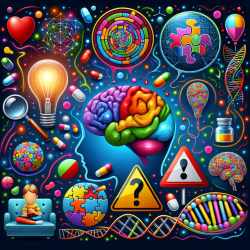Understanding ADHD: Facts, Values, and Controversies
Attention-Deficit Hyperactivity Disorder (ADHD) is a prevalent condition that affects millions of children worldwide. As practitioners, it's crucial to understand the complexities of ADHD diagnosis and treatment to make informed decisions that best support our young clients. The research article "Facts, values, and Attention-Deficit Hyperactivity Disorder (ADHD): an update on the controversies" provides valuable insights into the ongoing debates surrounding ADHD.
The Complexity of ADHD Diagnosis
ADHD is characterized by a range of symptoms, including inattention, hyperactivity, and impulsivity. However, these symptoms exist on a spectrum, leading to a "zone of ambiguity" where reasonable people may interpret behaviors differently. This ambiguity complicates the diagnosis process, which relies heavily on subjective interpretations of children's behavior by parents, teachers, and clinicians.
The article highlights that ADHD is diagnosed at varying rates across different regions, influenced by factors such as diagnostic criteria, cultural norms, and healthcare systems. For instance, the DSM-IV criteria used in the US tend to result in higher diagnosis rates compared to the ICD-10 criteria used in Europe.
Treatment Approaches: Behavioral vs. Pharmacological
Once ADHD is diagnosed, determining the most effective treatment approach is challenging. The article discusses the complexities and incomplete nature of treatment facts. While stimulant medications like Ritalin are commonly prescribed, they primarily address symptoms rather than underlying causes. Behavioral therapies, on the other hand, focus on teaching children self-regulation and improving overall functioning.
- Behavioral Treatments: These involve interventions that engage parents, teachers, and children in managing behaviors through structured environments and positive reinforcement. Research suggests that behavioral treatments can lead to long-term improvements in functioning.
- Pharmacological Treatments: Medications can provide quick symptom relief but may not lead to long-term academic or social improvements. Concerns about side effects and the authenticity of self-perception in medicated children are also discussed.
Values in Decision-Making
Decisions about ADHD diagnosis and treatment are not solely based on facts; they also involve values. Practitioners, parents, and children may hold different views on the goals of treatment, such as reducing symptoms versus enhancing overall functioning. These values influence whether a pharmacological or behavioral approach is favored.
Truly informed decision-making requires grappling with these complexities and considering the child's unique needs and family circumstances. Practitioners should engage in open dialogues with families to ensure that treatment plans align with their values and goals.
Encouraging Further Research
The article emphasizes the need for ongoing research to better understand ADHD and improve treatment strategies. As practitioners, staying informed about the latest findings and engaging in continuous learning can enhance our ability to support children with ADHD effectively.
To read the original research paper, please follow this link: Facts, values, and Attention-Deficit Hyperactivity Disorder (ADHD): an update on the controversies.










